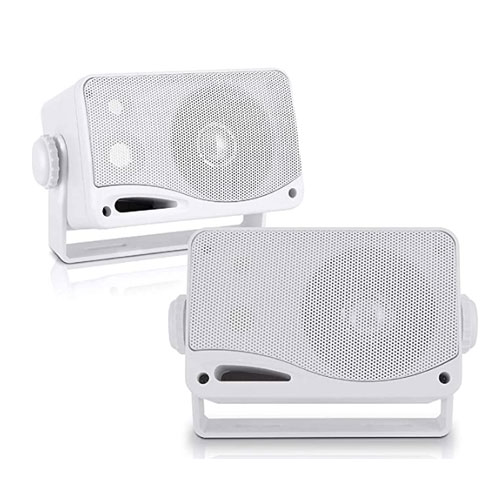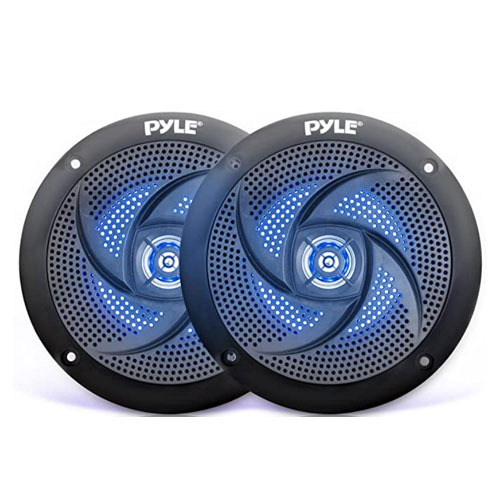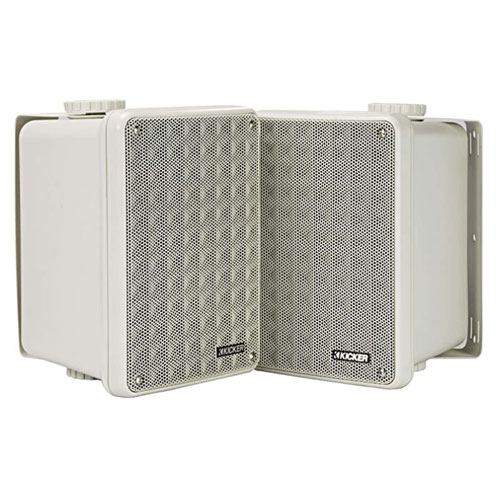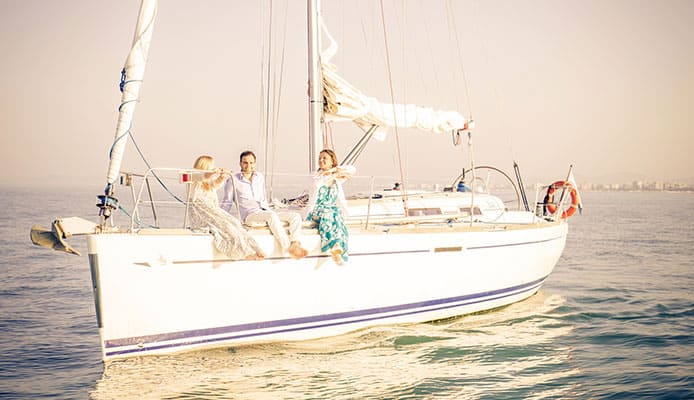
-
1.
-
2.
-
3.
-
4.
-
5.
Designed for marine use, the best marine boat speakers in our roundup deliver top-notch sound on the open water and can take the punishment the saltwater environment is sure to give them. They can stand up to prolonged exposure to sea spray and intense UV rays without failing.
With the ever-increasing range of brilliant marine grade speakers that can be installed into your boat, listening to your favorite music doesn’t have to be confined to headphones or substandard portable speakers. You can enjoy the best audio quality while out there on the water just like you do at home.
In addition to the reviews of the best marine audio speakers, we’ve created a buying guide with the things to consider so you can find the perfect one for you. After reading this guide, you’ll be able to make an informed choice and get the best boat speaker for you and your vessel. If you want to upgrade your boat sound system, consider these top picks.
OUR TOP PICK
Kenwood KFC-1653MRW 6.5″ 2-way
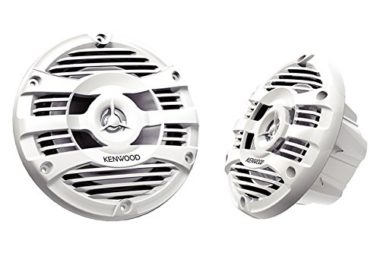
- Stand Out Features - Why We Love It
- Excellent sound quality, clarity, volume and bass
- Balanced dome tweeter and water-resistant cone
- Great full-range sound that can be heard in the open
- Durable marine-grade construction
Best Use: Boats, Marine Environment
Speaker Size: 6.5″
Frequency Response: 60Hz – 20,000Hz
Impedance: 4 ohms
Mounting Depth: 2-7/16″
EDITORS CHOICE
Polk Audio DB522 DB+ Series 5.25″ Coaxial
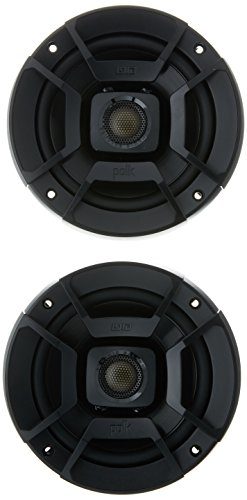
- Stand Out Features - Why We Love It
- Crystal clear audio in watercrafts
- Marine certified water and weather resistant build
- Tested for ability to withstand salt-fog, UV and humidity
- Powerful speakers with 300 watts peak power
- Simple drop-in installation
Best Use: Marine, Boats, ATVs, Motorcycles, Campsites
Speaker Size: 5.25 inches
Power Output: 300 watts
Waterproof Rating: IP55
Mounting Cut Out: 4.76″
Dimensio
BEST VALUE
Pyle 6.5 Inch Waterproof Full Range Dual
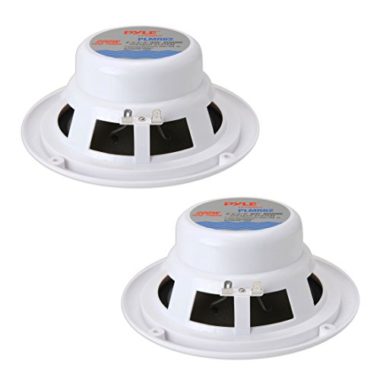
- Stand Out Features - Why We Love It
- Great sound quality at an inexpensive price
- 200 watts peak power capability
- Waterproof and weather resistant
- Rugged and durable construction
Best Use: Fishing Boat, Dock, Marine Watercrafts and Automobiles
Speaker Size: 6.5″
Frequency Response: 85Hz-20Khz
Impendence: 4 Ohms
Power Handing: 100 Watts RMS, 200 Watts peak
Mounting: Depth: 2.48”, Cutout: 5.31”
Dimensions: 7.09 x 7.09 x 3.39 inches
- Stand Out Features - Why We Love It
- Weatherproof and waterproof boat speakers
- 200 watts peak power capacity
- High-quality loud and clear audio in a boat
- Compact and perfect for small spaces
- Corrosion-resistant removable mesh grills
Best Use: Boat, Marine, Small Vessels, Poolside, Lakeside, Patio, Beach
Speaker Size: 3.5 inch
Frequency Response: 70Hz-21kHz
Impedance: 4 ohms
Power Handing: RMS: 100 watts, Peak: 200 watt
Dimensions: 5.25 x 3.75 x 3.63 inches
Sony XSMP1621 6 1/2-Inch coaxial 2-way
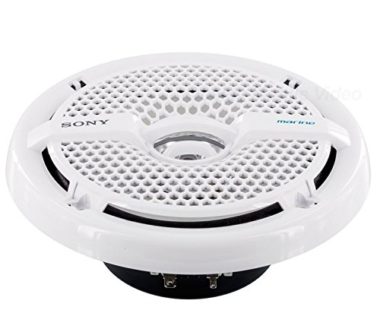
- Stand Out Features - Why We Love It
- Dual cone speakers emit great sound quality in the open
- Removable grille you can paint to match your boat
- Rugged marine-grade construction
- UV and saltwater resistant for marine use
Best Use: Marine Environment, Outdoors
Speaker Size: 6.5 inches
Water Resistance Rating: IPx5
Power Handling: RMS: 65 Watts, Max: 140 Watts
Dimensions: 6.87 x 6.5 x 2.12 inches
Polk Audio DB651 6.5″/6.75″ 2-Way
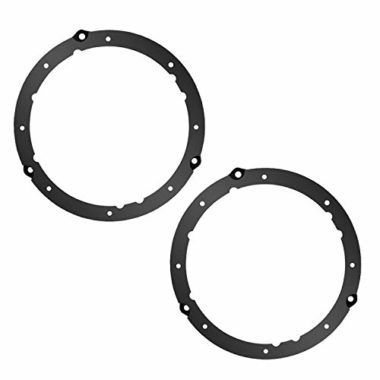
- Stand Out Features - Why We Love It
- High-quality audio reproduction and distortion-free sound
- Marine certified durable marine speakers
- Compatible with OEM factory systems
- Compatible with high-powered aftermarket units
- Easy drop-in installation
Best Use: Boat car, truck or SUV
Speaker Size: 6.5″ / 6.75″
Power Handling: Peak: 360 watts per pair, RMS: 120 watts per pair
Mounting Locations: 6×9″ and 5×7″/6×8″
Dimensions: 8 x 14.5 x 4.75 inches
JBL 6.5” Two-Way Coaxial
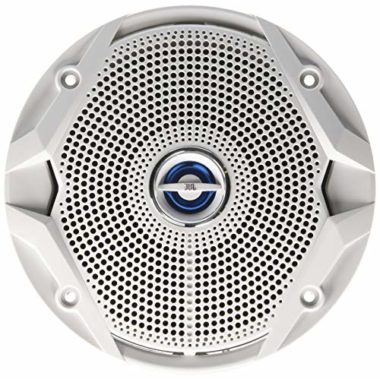
- Stand Out Features - Why We Love It
- Woofers and balanced-dome tweeters for superior sound
- UV and corrosion-resistant polymer baskets and grilles
- Waterproof motor structures protect against water damage
- Rubber surrounds for superior edge protection
Best Use: Marine watercrafts
Speaker Size: 6.5”
Dimensions: 9 x 5 x 8 inches
- Stand Out Features - Why We Love It
- Waterproof and weatherproof speakers
- Complete marine stereo sound system
- Tough marine-grade aluminum construction
- OEM replacement size and low profile design
- Built-in blue LED lights
Best Use: Boat, Marine Watercraft, Off-Road Vehicles
Power Output: 100 Watt MAX (50 Watt RMS)
Impedance: 4 Ohm
Frequency Response: 90Hz-18khz
Mounting Hole: Diameter: 5.2 inches, Depth: 9 inches
Dimensions: 1.5 x 5.24 x 5.24 inches
Boss Audio MR50B 150 Watt (Per Pair), 5.25 Inch
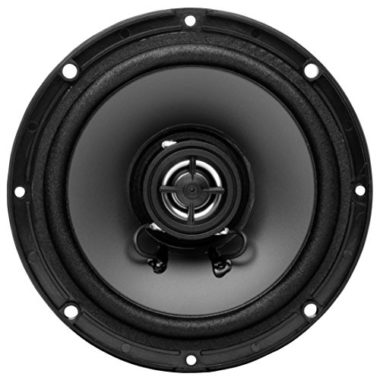
- Stand Out Features - Why We Love It
- Dome shaped tweeter for wider dispersion of sound waves
- Top rated sound quality and ease of installation
- Nice range of sizes and power outputs
- Durable weather resistant construction
Best Use: Boat, Outdoors, Marine
Speaker Size: 5.25 inch
Wattage: 150 Watts
Impedance: 4 Ohms
Frequency: 120 Hz to 18 kHz
Mounting Depth: 2.2”, Hole 4.9”
Warranty: Three Years
Kicker KB6000 6.5″ Full Range Indoor/Outdoor
- Stand Out Features - Why We Love It
- Full range 6.5 inch speakers with horn tweeter
- Crisp and dynamic full sound quality
- Vertical or horizontal mounting options
- Durable rust and UV resistant speakers
Best Use: Boat, RV, Garage, Patio, Poolside, Open Air, Indoors
Wattage: Up to 150 Watts
Dimensions: 16.8 x 15.3 x 9.9 inches
Warranty: One Year
How To Choose A Marine Speakers – Buying Guide
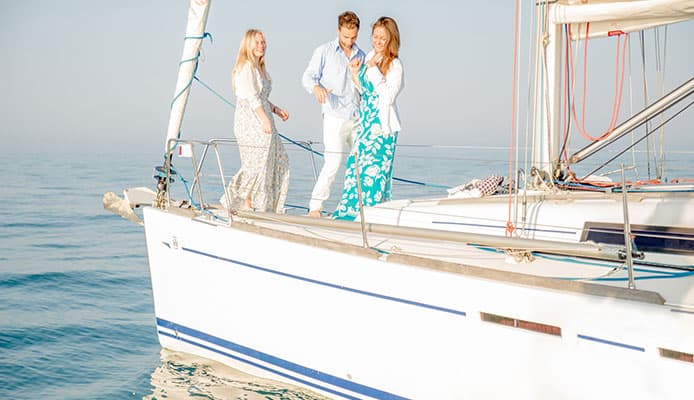
Audio
When you’re buying your boat speakers, you need to ensure that you have the right sound output otherwise you won’t be able to hear it. Due to the surroundings that marine waterproof speakers will be used in, there are several challenges that top-rated boat speakers have to overcome.
Being out in the open air, there’s nothing for the sound to rebound from and the audio has to be clear and loud enough so the sound waves can travel directly to you. Another thing that can affect the sound getting to your ears is the wind and noises in the surrounding.
Whether you’re on a boat with the hum of the engine or at a beach with the crashing of the waves, the sound should be powerful enough to pierce through the wind and noises. The best marine-grade speakers are designed to overcome these challenges.
Durability
With marine audio speakers, durability is a top priority. These speakers will be exposed to the elements and seawater and shouldn’t fail at the first interaction with saltwater. Make sure you buy marine grade speakers designed with this purpose in mind. All speakers for your boat need to be at least water-resistant. Waterproof marine speakers that offer an extra edge of protection.
Salt is the best exponent at creating rust. You want to ensure the speaker you’re considering are rust and corrosion resistant. The sun’s UV rays can damage all electronics like diving computers. Speakers that can resist UV rays are ideal.
Ease of installation
Once you’ve chosen the speakers you want, they’ll need to be installed. If you’re replacing existing speakers, then this is going to be a simple task that you can most likely do yourself. Be sure you measure your speaker holes to determine the size speaker you need.
If you’re installing a new system, this might require more expert installation as holes will have to be cut out. If you don’t want to cut into your boat, you can get the best portable boat speakers that wouldn’t require installation. If you’re installing numerous speakers around your boat, it can get tricky and the best option would be to find a professional to install them.
Use of Speakers
Before you buy speakers, you need to determine what you’re going to be using them for so you can get the best boat speakers fit for the purpose. What activities will you be doing on the boat while the music is playing?
If you’re going to be using your speakers while fishing on calmer waters, loud volume won’t be a priority. If you’re going to be waterskiing, you’ll want speakers that have a much higher wattage and volume.
Location
The location of your speakers is important to get the best sound possible. Speaker placement is even more important when you’re on a boat because of all the things that can interfere with the sound. It could be that you’re simply upgrading pre-existing speakers and know exactly where you’re going to put them.
If you are installing new speakers from scratch, then you want to pick the spots that are going to give the sound the most coverage. Picking the wrong location could give you a hole in the side of your boat that you don’t need and will regret later.
Directionality
The location of your speakers is important due to the directionality of the sound. Most speakers only play sound straight out in front of them. In a closed room, sound is enhanced when it bounces off the walls and other surface. Unless you’re below deck, you don’t have that luxury with speakers on a boat. Therefore, you want them pointing into the space where you need to hear the sound.
Another consideration in terms of the direction of your speakers is stereophonic sound. When music plays out of at least two speakers, different sounds can be playing in different speakers. Therefore, you need one speaker on either side of you to get a much better and richer sound.
Magnetic Shielding
Speakers contain magnets and the magnets need to work without interference to give you the rich sounds that you’re looking for. The magnets in speakers can also interfere with the functioning of devices such as compasses. If you’ve to install the speakers near the boat’s compass, ensure the speakers you choose have magnetic shielding so they won’t interfere with the compass or anything else onboard.
Water Resistance
Of all the features you will want to look for in a marine speaker, water resistance is one of the non-negotiables. If you’re installing speakers onto a boat, then they simply have to be water-resistant.
Being water resistant means they will still work should they be subjected to the occasional splash or rainfall. If you’re looking for a higher level of assurance or are on a boat that might be subjected to a higher level of contact with water, a waterproof speaker is the best option.
You might also be interested in:
Amplifier
If you’re looking for the best boat speakers to be as loud as possible, choose one with a high wattage. If you need your speakers to reach a higher volume, then it might be worth investing in an amplifier.
The lack of hard objects for the sound waves to bounce off, the wind and the background noise can all play a factor in not getting the sound level you want. Getting an amplifier will allow you to turn up the volume and play the music as loud as you want.
Sound Quality
Look for speakers with a high decibel rating as the higher the rating, the greater the speaker’s ability to convert power into sound. 2-way speakers are better than 1-way speakers as they are able to produce great sound over a range of frequencies.
Most of the speakers we’ve reviewed here are 2-way and well-known for producing top-quality sound. Aside from the decibels, frequencies, and power, it’s important to read marine speaker reviews and check the ratings to see what others are saying about the speakers.
FAQs
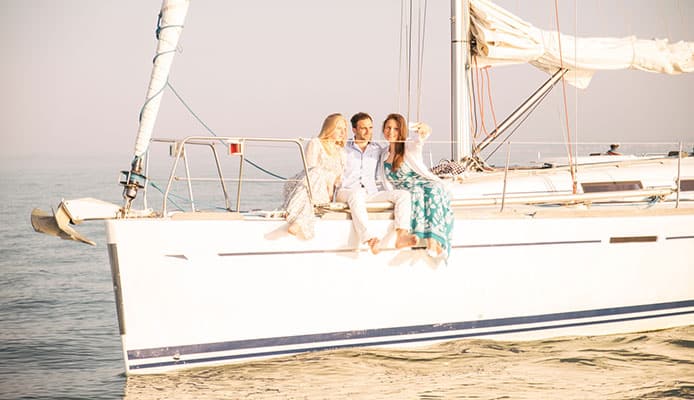
Q: What Are The Best Marine Speakers?
Our top pick of the best marine speakers are the Kenwood 2-way marine speakers because of their top-notch sound quality in a boat and the tough marine-grade construction that can withstand the punishment the marine environment is sure to dish out.
Q: Are All Marine Audio Speakers Waterproof?
No, some marine speakers are just water resistant. They will be able to handle brief water attacks such as the mist of a wave or light rain. While not all speakers are waterproof, some definitely are and they can cope with exposure to a lot of water as their electronic units are completely sealed so that no water can enter.
Q: How Many Speakers Do I Need?
You need at least two speakers in a boat, as they will allow you to have stereo sound and more depth to the music. You could require numerous speakers in order to cover the whole boat and get the sound level you’re looking for.
Q: What Is Special About Marine Speakers?
What sets marine speakers apart is their ability to resist the elements in a marine environment. Marine grade speakers can withstand the punishment the saltwater environment will throw at them over the years. They’re water-resistant and resistant to damage by corrosive salt water and UV rays. Marine waterproof speakers are a lot tougher than standard speakers for home use.
Q: What Audio Cable Should I Use For Marine Speakers?
On a boat, it’s always recommended to use copper wire as it doesn’t corrode as quickly as other metals so will last for much longer. You also need to check that the gauge of the wire matches up to the power that you’re going to put through it. There are simple charts and online conversion tables that can guide you with this.
Q: Do I Need A Receiver?
If you’re simply replacing old speakers, it’s unlikely that you will need a separate receiver for your speakers as this should be integrated into your system. If you’re unsure on whether you need an additional receiver, an installation company can look at your individual circumstances and advice you.
Q: Why Can’t I Just Use Some Car Speakers?
Car speakers aren’t designed to withstand the harsh marine environment and wouldn’t last if used on a boat. The exposure to saltwater sprays and splashes and the relentless sun would cause them to disintegrate, rust and corrode and stop working. If you want your boat speakers to last, they need to be marine grade.
Globo Surf Overview
Having a quality boat sound system can transform your boat into a much more fun place where great music can play and good times can be had. Finding the best marine stereo speaker requires some considerations.
Having good marine audio requires you to have marine-grade stereo speakers that are built to deal with the sea conditions. Hopefully, our marine speaker reviews and buying guide have enabled you to make an informed decision about which marine stereo system is best for your boat.



